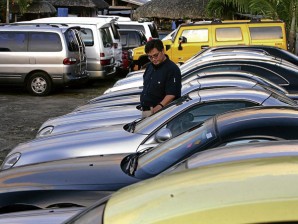Used-car market drying up

CUSTOMS CHIEF CHECKS ON CLASSY CARS Customs Commissioner Ruffy Biazon examines a Corvette Stingray, one of the hundreds of imported used cars at the free port in Sta. Ana, Cagayan. He has asked President Aquino to issue an executive order to settle two allegedly conflicting orders on the importation of second-hand cars for resale in the country. INQUIRER/ MARIANNE BERMUDEZ
STA. ANA, Cagayan—Buyers of imported second-hand cars and vans have begun canceling orders in what vehicle dealers said was the aftermath of the controversial Supreme Court ruling that banned the importation of used cars at the Cagayan Special Economic Zone and Freeport (CSEZFP).
Jaime Vicente, president of the Automotive Rebuilders’ Industry of Cagayan Valley (Aric), said some of their clients had called to discontinue their purchase of preordered cars, even before the arrival Saturday of the latest shipment of used vehicles.
“The damage has been done. We do not know if we can sell those vehicles even if we [are allowed] to dispose of them,” Vicente said, referring to the more than 700 units covered by the revived ban on the processing of imported used cars and vans.
The Bureau of Customs (BOC) and the Land Transportation Office this week ordered their field offices in Cagayan to stop processing the papers of used vehicles that arrived here on Feb. 11 and that of the shipment arriving Saturday, following the recent Supreme Court ruling that reaffirmed the validity of Executive Order No. 156.
The order, issued by former President Gloria Arroyo in 2002, prohibits the importation of used vehicles including those coursed through free ports, except those used by returning immigrants and members of the diplomatic corps, as well as buses, trucks and special purpose vehicles such as ambulances and fire trucks.
Article continues after this advertisementSought for comment, Nilo Aldeguer, senior deputy administrator of the Cagayan Economic Zone Authority, the agency tasked to manage and supervise CSEZFP operations, said the buyers’ reaction was expected.
Article continues after this advertisement“That is the prerogative of car buyers, which will result in [business] losses [to] our locators if the order to suspend processing by the BOC is not reconsidered,” he said.
‘Completely absurd’
In a statement, Vicente also dismissed “as completely absurd” the claim that the second-hand auto industry here had been affecting the sales of the country’s major car manufacturers.
“Considering the reported phenomenal growth in yearly sales of brand new units in the Philippines amid worldwide recession, the notion that our business activity [at the CSEZFP] impedes the growth of the [country’s] vehicle industry as a whole is completely absurd and tends to stretch one’s minds into incredulity,” he said.
In a phone interview, Vicente said used-car importers were preparing for an expected slowdown in their business, as the government’s pronouncements had been scaring off prospective buyers.
“Buyers are now coming [only] in trickles … Before this problem broke out, sales had been quite good almost on a daily basis,” he added.
Conflicting provisions
Vicente’s statement came on the heels of requests by used-car dealers for government to reconsider the ban, citing what they said were conflicting provisions in the application of EO 156 and EO 418. EO 418, signed by Arroyo in 2005, modified the tariff rates and import duties on imported used vehicles.
The Aric interpreted the provisions of EO 418 to mean that government now approves used-car importation and that the directive repealed EO 156. Aric members also maintained that the Supreme Court only ruled on the legality of imposing a permanent injunction on the operations of Forerunner Multi-Resources Inc., the “master licensor” for used-car importation at the Cagayan ecozone.
Peter Geroue, president and chief executive officer of New Apollo International Cagayan Trading Inc., the biggest dealer of Japan-sourced vehicles here, offered this suggestion: “We ask the government to allow us to process [the documentation and registration] of the 700 [vehicles], to allow us to recover our investment and at the same time, [allow the BOC] to collect the import duties,” he said.
After that, the group could stop the used-car importation if the government says so, Geroue said. “That is the win-win solution,” he added.
The group of resort and restaurant owners here also expressed concern over the looming shutdown of the used-car industry in the free port. “Many of those who come to Sta. Ana to look for [imported secondhand] vehicles dine and stay overnight in our restaurants and inns, so our losses would be two-fold,” said Joan Taguba, president of Sta. Ana Hotel and Restaurant Resort Association.